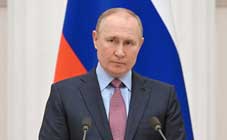
Putin submits Agreement on Dual Citizenship Between so-called South Ossetia and Russia
By Khatia Bzhalava
Thursday, March 17, 2022
Russian President Vladimir Putin has submitted an agreement simplifying the acquisition of Russian citizenship by “citizens” of so-called South Ossetia to the State Duma for ratification. Based on this document, signed in 2021, South Ossetians can obtain Russian citizenship without renouncing their citizenship. The same will apply to Russian citizens.
The residents with dual citizenship will have the right to social security, education, and medical care as per the legislation of the territory they reside in permanently. The norm also applies to military service.
Russia provides the so-called citizens of South Ossetia the right to apply for Russian citizenship in a simplified manner. If ratified, the document will be valid for five years and it will be automatically extended until either party wishes to terminate it.
Georgian Foreign Ministry echoed the issue saying that any agreement signed between the occupant country and its puppet regime is void.
"In gross violation of the principles of international law, the Russian Federation has been using forced ‘passportization’ of the population in the occupied regions of Georgia since the early 2000s as an illegitimate step and a hybrid tool against Georgia,” the ministry’s statement reads, adding that the international community strongly supports Georgia's sovereignty and territorial integrity and unanimously condemns the illegal ‘passportization’ of residents in the Russian-occupied territories.
As chairman of the Foreign Affairs Committee, Nikoloz Samkharadze told reporters, Russia has once again proved that it plans the actual annexation of both Abkhazia and the Tskhinvali (so-called South Ossetia) region. According to him, this is yet another provocative step aimed at violating the territorial integrity of Georgia.
On Saturday, March 12, the de facto authorities of Abkhazia (another Russian-occupied region) held so-called parliamentary elections in the region. According to the Ministry of Foreign Affairs of Georgia, this fact is a violation of the norms and principles of international law and is another ‘futile’ attempt to legitimize the illegal occupation of two Georgian regions.
The international community, including the United States, the European Union, and NATO, does not recognize the legitimacy of the elections, emphasizing that Abkhazia and Tskhinvali (so-called South Ossetia) are integral parts of Georgia. According to Carl Hartzell, the European Union Ambassador to Georgia, the EU would continue pursuing its non-recognition policy in regards to Georgia’s breakaway regions of Abkhazia and Tskhinvali.
According to the President of the Congress of Local and Regional Authorities of the Council of Europe (CoE), Leendert Verbeek, the de facto authorities of Abkhazia have ‘once again’ undermined the principle of the territorial integrity of Georgia, “forcing this region further into isolation to the detriment of the local population”. As he noted, the so-called elections, “instead of strengthening, further erodes stability in this region and is, moreover, the wrong signal at the wrong time.”


